Please be aware that this blog post discusses historical events and themes that resonate with current world events.
For Sir Rex Hunt, Governor of the Falkland Islands, Thursday 1 April 1982 ‘began the same as any other day’. There had been some speculation that Argentina might pursue its long held claim to the Falklands by military means since 19 March, when a group of Argentine scrap metal merchants (including some Argentine Marines) had landed at South Georgia Island, a dependency of the Falkland Islands; but there was a good deal of diplomatic activity and no real sense of an imminent invasion threat.
Sir Rex Hunt was a good natured man, stocky in build, who had enjoyed a long diplomatic career before he accepted the governorship of the Falklands in 1980. The posting enabled him to pursue his interest in flying, and he enjoyed life on the islands, travelling around in his official car, a red London taxi. He and his wife Mavis became very much part of the Falklands community.
That Thursday, the Governor worked on his paperwork at Government House in the capital, Stanley, and then took lunch with his family. He was pleased to hear that his son, Tony, was ‘getting down to serious study for his A levels’. Hunt returned to the office and resumed work. Then, at 15:30, a highly significant telegram, from Lord Carrington (the Foreign Secretary), arrived.
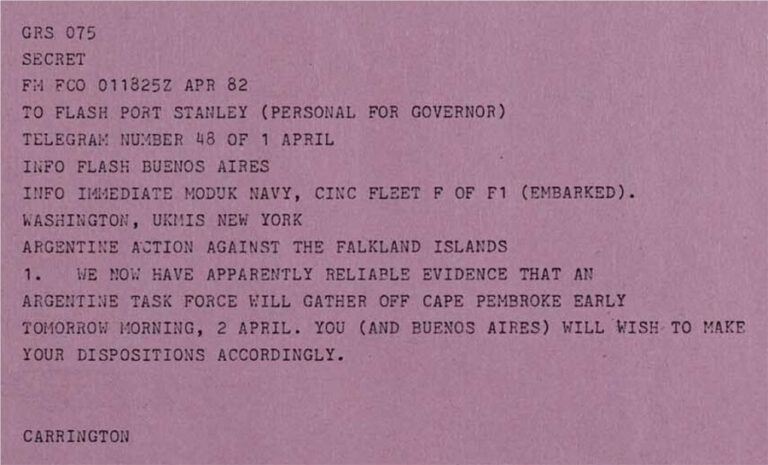
There’s something very powerful and arresting about the telegrams in our files; they convey a real sense of immediacy and drama. One can imagine the sense of shock that Hunt would have felt when reading this very brief warning, phrased in diplomatic language: ‘you will wish to make your dispositions accordingly’ is characteristically British. Hunt’s first priority was to order his staff to shred and burn all classified papers.
Defence of the Falkland Islands was the responsibility of Naval Party 8901, a Royal Marines detachment. Major Gary Noott was in the process of handing over to Major Mike Norman when they received an urgent call from the Governor. Because of the handover, the strength of the Royal Marine garrison was considerably greater than it would have been otherwise; but it was still only 69 in total. They were supplemented by the Falkland Islands Defence Force (FIDF), a locally maintained volunteer defence unit.
Delaying tactics
As Mike Norman later commented, ‘remarkably, there was not a clearly defined national contingency plan in the event of an Argentinian invasion of the Falklands’ (see footnote 1). There was, however, a local plan, which entailed a group of Marines (with the Governor) breaking out of Stanley into the countryside, and attempting to set up a seat of government there. But Hunt vetoed this previously agreed plan, telling Mike Norman that he would continue to stay in Government House, he did not want to abandon Stanley, and he opposed house to house fighting in the capital, as he was worried about civilian deaths. Mike Norman was well aware that all the Marines could really do, in the face of the vastly superior numbers of the Argentine forces, was to delay them. The Marines continued to set up their headquarters at Government House, and Hunt made two broadcasts to the islanders that night through the local radio station, urging everyone ‘to remain calm and keep off the streets’.
Stanley airport was a source of worry as the Argentinians were likely to land troop transports on the runway. That runway needed to be cratered but there was a shortage of adequate explosives and so this was not done. Lord Carrington sent a message to Hunt on 2 April, but it was never received, thanks to a breakdown in communications.
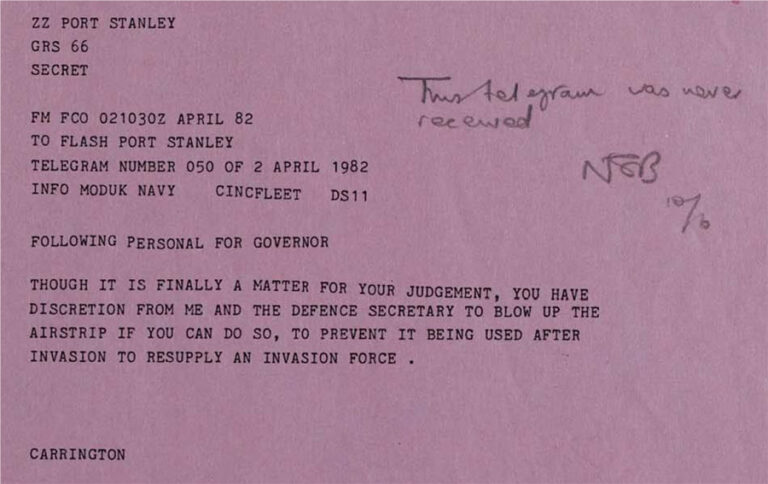
At 05:15 on 2 April, Government House received the first definite news that Argentine landing craft were approaching. Some 50 minutes later, Hunt and his contingent of Marines heard gunfire from the West, followed by bomb explosions. Mike Norman realised that his forces had been wrong-footed, that the Argentinian forces had come in behind the British positions: ‘they had a very good plan and it was well executed’ (footnote 2). The Royal Marines were soon fired upon from a ridge above Government House, and explosions started all around the building, caused by the use of stun grenades by the Argentinians. For Rex Hunt, the noise was deafening, and he dived under the shelter of his office desk.
The Argentinians made a determined assault on Government House, to try to force their way in, but this attempt was repelled, leaving one Argentine dead and three wounded. But Hunt and his group of Marines were pinned down.
Communication breakdown
At 06:45 in Stanley (11:45 in London) the Ministry of Defence reported to Admiral Sir John Fieldhouse, the Commander-in-Chief Fleet, that all communications with Stanley had gone down, due to an apparent equipment fault. As a result, it took the British Government many hours before it could catch up with the true state of affairs in the Falklands.The Royal Navy Patrol vessel HMS Endurance reported (to the FCO) this news which originated from the radio station at Grytviken, South Georgia:
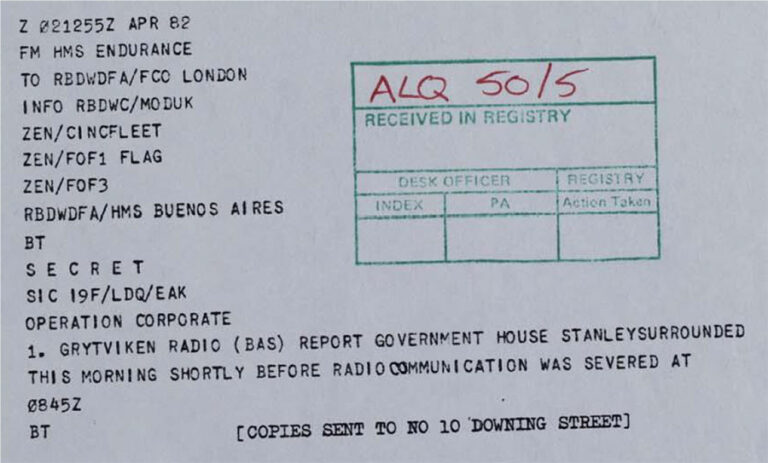
Following discussions with Commander Norman about all the possible options, Hunt decided to negotiate a truce, and around 08:45 he contacted Hector Gilobert, who was a local representative of the Argentine state airline. Hunt managed to persuade Gilobert to act as an intermediary. Eventually Rear Admiral Busser, the Commander of the Argentine Marines, walked into Hunt’s office. He was tall and personable and keen to shake hands with everyone, but Hunt could not do this: he later wrote that he ‘had a momentary desire to pull my pistol out of the drawer and empty the magazine into his chest’ (footnote 3). He then told Busser: ‘This is British property. You are not invited. We don’t want you here. I want you to leave now and take all your men with you’ (footnote 4). Busser replied that he had an overwhelmingly superior force, and that ‘the only sensible thing you can do is to tell these brave men to stop fighting’, in order to avoid bloodshed. Reluctantly but wisely, Hunt asked Mike Norman to give the order to lay down arms – it was 09:25.
Later that morning, Rex Hunt agreed, after initial reluctance, to go to the Town Hall to meet the Argentine overall Commander, General Osvaldo Garcia. Hunt gave an account of what transpired at this meeting to Lord Carrington. It shows Hunt’s spirited attitude of defiance.
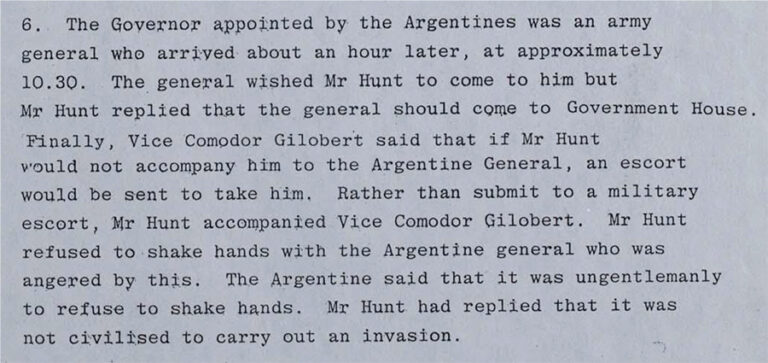
The battle for Stanley had come to an end. Amazingly, the Royal Marines had suffered no casualties. Rex Hunt and his family, and the Royal Marine detachment were flown out of Stanley later that day to Montevideo, Uruguay’s capital. Historian Dominic Sandbrook described Hunt’s departure thus: ‘in a final touch of bravado, Hunt insisted on wearing his full ceremonial uniform, complete with sword, gold braid and gigantic ostrich-feathered hat, and drove to the airport in his red cab, the Union Jack fluttering proudly on the bonnet’ (footnote 5). Many of the watching islanders were in tears.
The months in exile in London which were to follow were difficult for Rex and Mavis. Hunt briefed Prime Minister Margaret Thatcher several times. The Falklands were liberated on 14 June 1982 and Hunt made a happy return soon after. He continued to serve as Governor of the Falkland Islands until 1985.
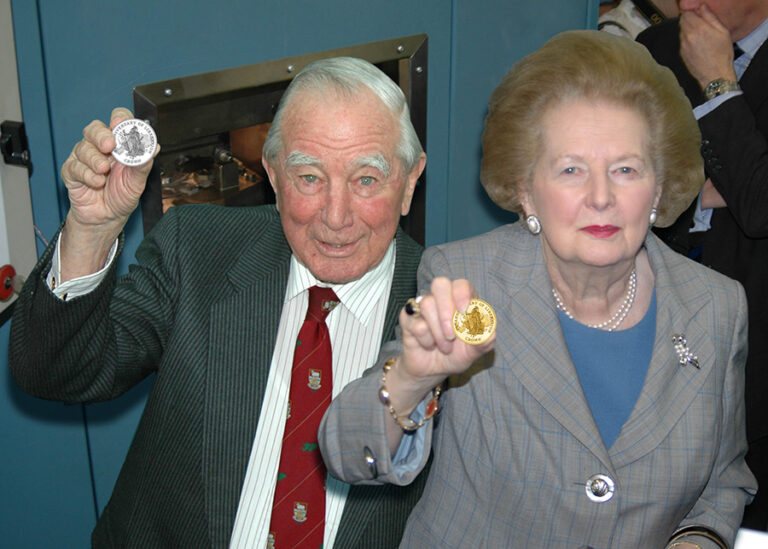
Footnotes
- ‘The Falklands War: There and Back Again, The Story of Naval Party 8901’, Mike Norman and Michael Jones (Pen & Sword Military, 2019), p. 62.
- ‘The Falklands War: There and Back Again, The Story of Naval Party 8901’, Mike Norman and Michael Jones (Pen & Sword Military, 2019), p.90.
- ‘My Falklands Days’, Rex Hunt (Politico’s Publishing, 2002), p.194.
- ‘The Falklands War: There and Back Again, The Story of Naval Party 8901’, Mike Norman and Michael Jones (Pen & Sword Military, 2019), p.105.
- ‘Who Dares Wins: Britain, 1979-1982’, Dominic Sandbrook, Allen Lane, 2019, p. 750.
While much information on the military operations and events is in the public domain and easily accessible, it’s interesting to read about the actions of Hunt, Busser and Garcia in the immediate aftermath of the invasion.
It is standard procedure to destroy all Government records in the event of an invasion, as in the case of The Netherlands in 1940. I really think TNA should stop these warnings at the top, it is history and war and is not as though there are gory details, can TNA please treat us as adults.
The Falklands War 40 years on. Thank for the above description of the actions of Hunt, Busser, and Garcia. Let me wishing for. Including the telegrams was superb. Thank God Margaret Thatcher was Prime Minister at the time of the invasion. All the British troops and naval forces were tremendous. Thank God we still an aircraft carrier and hats off to those Harrier jets pilots who performed so brilliantly. And never to be forgotten are lives lost on HMS Sheffield and those fought, outnumbered, to liberate the capital of Stanley.
As an ex Merchant Seaman who was caught up in this time of British history, I once again feel as if the vey important role on the Merchant Fleet has been not forgotten but sadely left in the shadows.R.I.P. All concerned.
I really thought that some documentary evidence would have survived to show how Mrs Thatcher’s diplomats had set up Galtieri to help himself to the Falklands but it seems that they and the civil servants have been 100% efficient in destroying all such evidence. By 1982 Mrs Thatcher was so hated that the tories would be wiped out in any election. The optimum tactic in this situation was to set up a war AND win it. The task force was a magnificent success – until it got to the Falklands. The Argies cheated when their planes shot up our ships. We were either only looking towards Argentina or the radar computers identified the exocet missiles as French – so were friendly and they were allowed to hit their targets. It was lucky for UK that the Argies gave up without knowing we had apparently run out of bullets……
As is normally the case when history is summarised many of the important facts have been missed or ignored. Why were there only 69 Marines of two 40 man detachments? Where was HMS Endurance and what was she doing? Did Gen Buster really walk into Government House and talk to Rex Hunt before the RM were told to ‘lay down their arms’? Was there really only one dead Argentine? Was there a Naval Survey Party helping NP8901 defend GH?……….and many more!
The RN Hydrogaphers rounded up known Argentinians in Stanley and held them under guard at the FIPD Hall. They are always missed out of the story.
No mention of HMS Endurance’s RM Detachment & 9 RM from NP8901 who were taken to Grytviken, South Georgia by HMS Endurance to defend that island.
Once again the actions of all these brave men, RM & RN, on 2 & 3 April has been side-lined by history – it’s disgraceful!